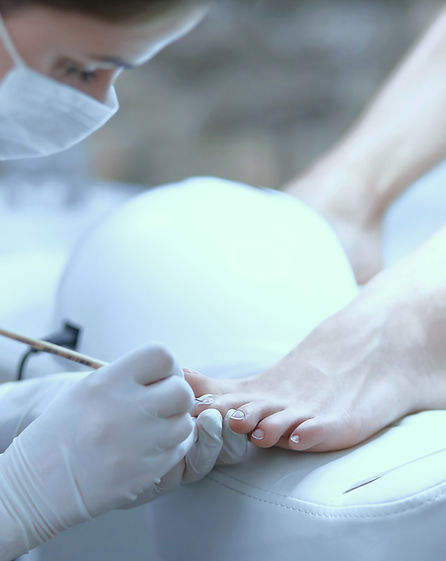
Diabetes & Foot Health
Just under 4 million Canadians live with diabetes. Having diabetes means that monitoring and maintaining good foot health is especially important.
Why is foot health with diabetes so important?
Having diabetes means your pancreas isn't functioning well enough to maintain blood glucose and insulin levels in your body. Maintaining blood glucose at healthy levels is especially important to keep your body working optimally. Lifestyle modifications, medications, and extra vigilance help maintain healthy blood glucose levels. You may find people tell stories about people they know with diabetes who have suffered severe issues with their feet. While well-intentioned, these stories are mostly just frightening. With well-managed blood glucose and prompt attention to foot issues, there's no reason a person with diabetes can't have a whole, happy life, without the scary stories. So, what are the things to watch for with your feet when you have diabetes?

What to watch for.
Diabetes Canada says,
"Diabetes can cause nerve damage (also known as diabetes peripheral neuropathy) and poor blood flow or circulation to the legs and feet (also known as peripheral arterial disease). As a result, people with diabetes are less likely to feel a foot injury such as a blister or cut. Diabetes can make these injuries more difficult to heal. Unnoticed and untreated, even small foot injuries can quickly become infected, potentially leading to serious complications." (Foot care: A step toward good health, Diabetes Canada)
According to the Diabetes Canada info sheet, Foot care: A step toward good health, daily foot care is important. The sheet can be printed from their website, but for your reading pleasure, we've copied parts of it here for you.
"Start by assembling a foot-care kit containing nail clippers, nail file, lotion, and a non-breakable hand mirror. Having everything you need in one place makes it easier to follow this foo-care routine every day:
-
Wash your feet in warm (not hot) water, using a mild soap. Don't soak your feet, as this can dry your skin
-
Dry your feet carefully, especially between your toes.
-
Thoroughly check your feet and between your toes to make sure there are no cuts, cracks, ingrown toenails, blisters, etc. Use a hand mirror to see the bottom of your feet, or ask someone else to check them for you.
-
Clean cuts or scratches with mild soap and water, and cover with a dry dressing suitable for sensitive skin.
-
Trim your toenails straight across and file any sharp edges. Don't cut the nails too short.
-
Apply a good lotion to your heels and soles. Wipe off excess lotion that is not absorbed. Avoid putting lotion between your toes, as excessive moisture can promote infection.
-
Wear fresh, clean socks and well-fitting shoes every day. Whenever possible, wear white socks - if you have a cut or sore, the drainage will be easy to see."

What happens at a foot care appointment?
When a person with diabetes comes for a foot care appointment, we're sure to do a thorough assessment, as well as provide care for any issues that might be of concern.
Things we check include:
-
pulse assessment (there are 2 pulse locations in each of your feet)
-
the temperature and skin colour of your feet - we're interested in colour connected to circulation, not overall skin tone.
-
Are there any calluses, corns, ingrowing toenails, etc?
-
We do a 10g monofilament test. This test checks for any loss of protective sensation. We use a 10g monofilament - like a piece of extra-heavy fishing line, and with your eyes closed, we touch 10 spots on each of the feet, and wait for you to tell us when you feel us touch. Then we talk about what we found.
-
We check the range of motion in your toes and ankles.
-
We give your toenails a nice trim and file smooth, and take care of any calluses or corns you might have. We're really good at that stuff.
-
And we always finish each foot care session with a gentle foot massage with a diabetic-friendly foot foam.
All our clients are encouraged to ask question or voice concerns about their foot health. It's our job to equip and empower our clients to make decisions about their health care that work best for them. And if we don't know the answer to something, we'll help you find someone who can help.
Proper and regular foot care is essential for overall health and mobility, yet it is often overlooked. Healthy feet support daily activities, prevent pain, and reduce the risk of serious complications, especially for individuals with diabetes, circulatory issues, or mobility challenges. Regular foot care helps detect problems early, preventing infections, ulcers, and other conditions that can lead to more severe health concerns. By prioritizing foot health, individuals can maintain independence and improve their quality of life.


